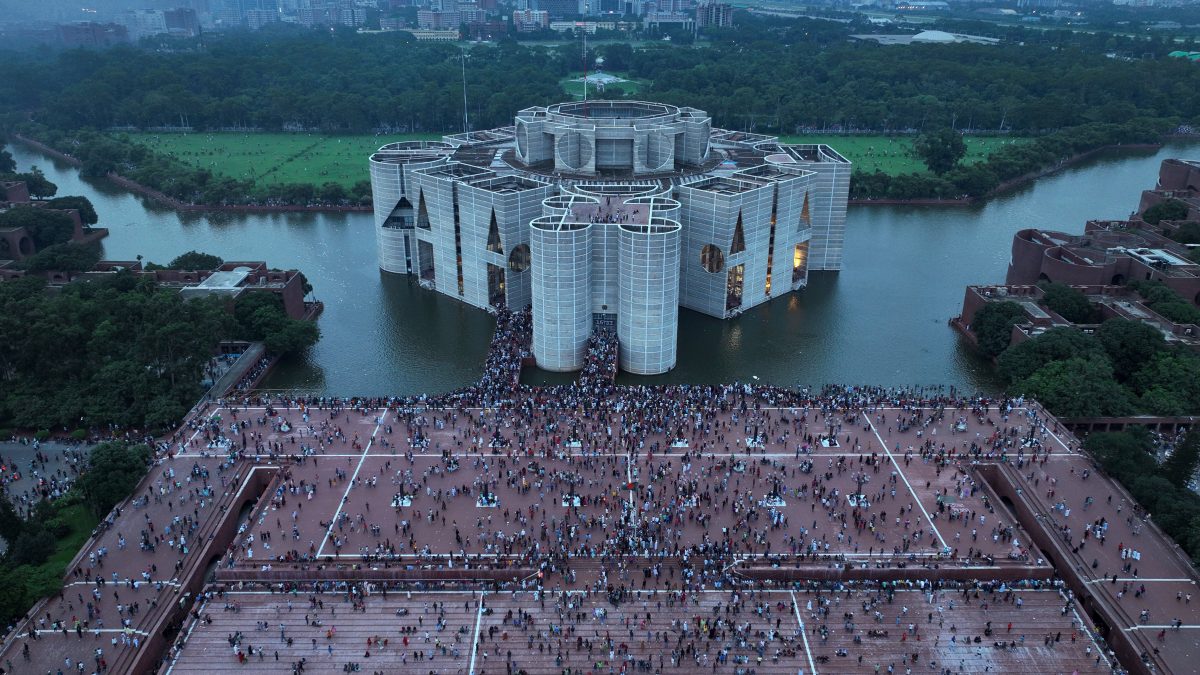Bangladesh appeared poised for change last year when former Prime Minister Sheikh Hasina was removed from office following a student-led protest movement, ending her 15-year rule and prompting her to flee to India.
Nobel Peace Prize laureate Muhammad Yunus assumed leadership of an interim government, pledging to restore calm, implement electoral and constitutional reforms, and conduct credible elections after weeks of unrest beginning on July 15, 2024, left hundreds dead.
One year later, the interim government continues to face political instability, religious polarization, and ongoing challenges in maintaining law and order. Hasina is currently on trial for crimes against humanity in absentia while in exile in India. Despite significant upheaval, efforts to build a Bangladesh founded on liberal democracy, political tolerance, and communal harmony have yet to succeed.
“The hope of the thousands who braved lethal violence a year ago when they opposed Sheikh Hasina’s abusive rule to build a rights-respecting democracy remains unfulfilled,” said Meenakshi Ganguly, deputy Asia director at Human Rights Watch, a New York-based human rights organization.
Change remains limited
The anti-government movement resulted in significant casualties. Hundreds, including many students, were killed in demonstrations marked by violent clashes. Protesters set fire to police stations and government offices, while confrontations between rival political groups turned deadly.
Abdur Rahman Tarif and his sister Meherunnesa joined the protests after the death of a cousin allegedly shot by security forces. He recalled being on the phone with Meherunnesa when the line went dead. Upon returning home through conflict-hit areas in Dhaka, he learned that she had been struck by a stray bullet while standing near a window. She later died at the hospital.
Following the transition, the Yunus administration established 11 reform commissions, including one focused on building national consensus with political parties to guide governance and electoral reforms.
Impact Shorts
More ShortsProgress, however, has been slow. Political disputes have delayed agreement on an election timetable. Mob violence, attacks on political groups, and increased hostility toward women and minorities have been reported.
While rights groups note that enforced disappearances appear to have ended, they allege the government has used arbitrary detention to target perceived opponents, particularly Hasina’s supporters, some of whom are reportedly in hiding. The Awami League, currently banned, claims over two dozen members have died in custody over the past year.
The interim administration has declared August 5 a public holiday to mark Hasina’s ouster. In a statement on July 30, Human Rights Watch said the interim government “is falling short in implementing its challenging human rights agenda,” adding that abuses against ethnic and minority groups continue in some regions.
“The interim government appears stuck, juggling an unreformed security sector, sometimes violent religious hardliners, and political groups that seem more focused on extracting vengeance on Hasina’s supporters than protecting Bangladeshis’ rights,” said Ganguly.
Yunus’ office has denied these allegations.
Elections expected in April
The timeline for returning to democratic elections remains uncertain. Disagreements between the interim administration and the main opposition, the Bangladesh Nationalist Party (BNP), have added to the uncertainty. The BNP has demanded elections be held by February, while Yunus has proposed April.
Islamist groups previously restricted under Hasina’s rule have gained space under the interim government. Meanwhile, student leaders from the protests have formed a new political party, calling for sweeping reforms and warning they will oppose any election held without them.
Some Islamist leaders have either been released or escaped custody. Jamaat-e-Islami, the largest Islamist party, has reentered the political scene and recently organized a large rally in Dhaka. The group has criticized both the BNP and Awami League, prompting concern among some analysts about rising polarization.
“Any rise of Islamists demonstrates a future Bangladesh where radicalization could get a shape where so-called disciplined Islamist forces could work as a catalyst against liberal and moderate forces,” said political analyst Nazmul Ahsan Kalimullah.
Others have questioned whether the interim government can deliver the reforms it promised.
“People’s expectation was (that) Yunus government will be focused and solely geared towards reforming the electoral process. But now it’s a missed opportunity for them,” Kalimullah added.
Ongoing frustration
For many, the events of the past year have not translated into meaningful change.
Mosharraf Hossain, father of protester Meherunnesa, said the movement reflected deeper discontent. “We want a new Bangladesh … It’s been 54 years since independence, yet freedom was not achieved,” he said.
Tarif echoed the sentiment.
“I want to see the new Bangladesh as a place where I feel secure, where the law enforcement agencies will perform their duties properly, and no government will resort to enforced disappearances or killings like before. I want to have the right to speak freely,” he said.
)